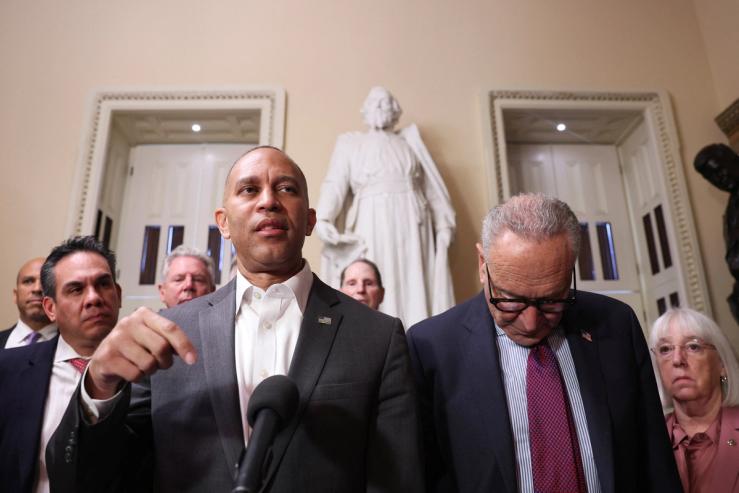The Scoop
Democrats have new polling to chew over as they rail against Republicans’ government funding bill. It’s unlikely to make them more eager to cave.
A new survey from the progressive firm Data for Progress and research firm Grow Progress, shared first with Semafor, shows seven in 10 Democrats support their party withholding votes unless Republicans make changes even if it risks a shutdown, while a similar share backs their party taking a “firmer stand” than they did in March.
What’s more, Democrats are arguing voters will blame the Republicans who control government for a shutdown, and the poll shows their voters share that view, 82-14. Large majorities of Democrats also think the party should fight President Donald Trump harder — even if they don’t win.
House Republicans plan to vote this week on a short-term spending bill that would extend current funding levels through Nov. 21, with the Senate following suit.
House Majority Leader Steve Scalise said leaders will put it on the floor as soon as they feel they have the votes. But they’ll need the support of at least some Senate Democrats for it to become law — and House Minority Leader Hakeem Jeffries and Senate Minority Leader Chuck Schumer on Tuesday expressed vehement opposition to the proposal because it does not include any of the health care provisions they’d sought.
“Chuck thinks you guys and gals will give him cover and focus less on the shutdown and the harm it does to the country, and more on the excuse they used to shut it down,” Sen. John Kennedy, R-La., told reporters on Tuesday.
House Speaker Mike Johnson said there is “zero chance” GOP lawmakers agree to reverse any of their changes to the Medicaid program. He added that extending Affordable Care Act subsidies, which are set to lapse at the end of the year and hike premiums, “is a December policy issue, not a September funding issue.”
Senate and House Republicans are in the process of reviewing proposals that could keep the subsidies from lapsing while addressing GOP concerns over cost. Options include tackling fraud and excluding higher-income Americans.
Know More
The short-term spending bill also includes language that would offer a fix to previous restrictions on Washington, DC’s ability to spend its own money, plus boost funding for security for all three branches of government in the wake of the assassination of Charlie Kirk. That breaks down to an extra $30 million for Capitol Police, $30 million for the Marshals Service and $28 million for the Supreme Court.
Lawmakers will be able to tap into the $30 million set aside for Capitol Police as part of a program that reimburses state and local law enforcement officials that protect them in their districts. House Administration Chair Bryan Steil said it’s possible appropriators decide to redirect some of it to other lawmaker security programs.
Whether the $30 million is enough will depend “on how it’s apportioned,” Rep. Greg Murphy, R-N.C., said. “We obviously have some really high-profile members who say a lot of things who make themselves more prominent and tend to use more money.”
The House and Senate are separately negotiating a package of three year-long bipartisan spending bills. The GOP’s hope is that the short-term spending bill can “keep the government open while all this work continues,” Johnson said.
“There’s no way to get it done right now,” Sen. Markwayne Mullin, R-Okla., said of the three-bill minibus. “There is an opportunity to do three, four maybe bills” later.
The funding talks will also touch on how to tackle lawmaker security long-term, Steil said, “to make sure that flexibility is there so we’re providing members the security that they need.” He added that he sees “real opportunity” in extending a pilot program, set to lapse at the end of September, that gave members $5,000 a month to spend on private security guards.

